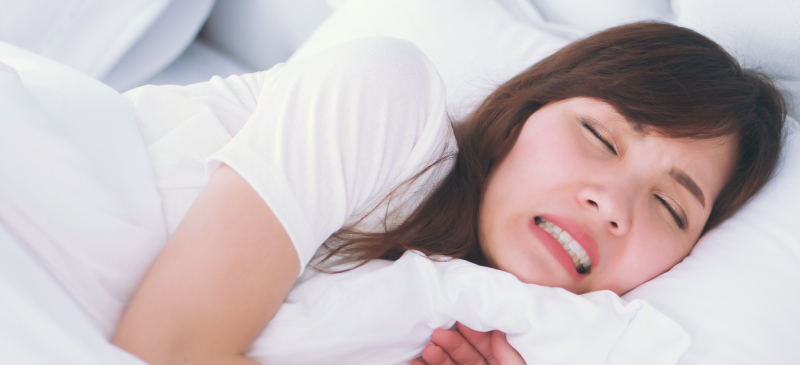Bruxism is one of the most common of all oral health conditions worldwide. Millions of men and women of all ages are known to suffer problems related to grinding and/or clenching of the teeth, though the vast majority of cases are never brought to the attention of dentists.
In more severe cases however, the damage caused may be visible during a routine dental check-up. If your dentist picks up on any of the signs of teeth clenching or grinding, they’ll provide the necessary advice and treatment accordingly. In most instances however, there may be limited visible evidence, leaving it to the respective patient to pick up on the signs and symptoms.
A few examples of which include the following:
- Awareness of involuntary clenching or grinding
- Tightness or pain in the jaw muscles
- Aches and general discomfort in the face
- Swelling around the jaw muscles
- On-going toothache and general oral discomfort
Any of these symptoms could suggest that you have a problem with teeth grinding or clenching. The problem in most instances is that bruxism can be most severe of all during the night. You may have no idea it’s happening, only to wake up with one or more of the symptoms listed above.
The good news is that irrespective of how severe or longstanding the problem may be, there are various potential solutions to explore. Effectiveness differs from one person to the next, but chances are you’ll find at least some relief in the following:
Stress Reduction
Believe it or not, the vast majority of cases of bruxism are caused by stress and anxiety. It’s often assumed that teeth clenching or grinding constitutes something of a physical health complaint in its own right, though in most cases is simply a symptom of another condition. To occasionally experience mild to moderate stress and anxiety is perfectly normal and inevitable. Nevertheless, anyone prone to prolonged or severe stress and/or anxiety should bring the problem to the attention of their doctor as soon as possible. Where teeth grinding is related to stress or anxiety, even the most advanced Bluetooth electric toothbrush in the world isn’t going to make a difference. You’ll first need to focus on reducing your stress and anxiety levels, before being able to get on top of your bruxism.
Keep Your Mouth Busy
One of the most effective ways of bringing teeth clenching and grinding under control is to simply keep your mouth busy. Dentists worldwide recommend chewing sugar-free gum throughout the day, as a means by which to keep plaque and bacteria under control. What’s also great about chewing gum is how the controlled chewing action significantly reduces your likelihood of aggressively grinding or clenching your teeth. Of course, this can seem counterproductive in instances where your jaw and/or teeth are already aching. Nevertheless, if you regularly notice you’re clenching or grinding your teeth during the day, chewing sugar-free gum as an alternative comes highly recommended.
Wear a Mouth Guard
If you believe the problem is happening while you sleep, one effective option for reducing pain and discomfort is to wear a mouth guard. While it can take a little getting used to, a mouth guard can protect your teeth while you sleep and generally reduce the pressure on your jaw. If you do decide to go for a mouth guard, it’s worth speaking to your dentist to have one specially made to suit your mouth. Those sold over-the-counter are more generic in nature, though one size most certainly does not fit all. Plus it’s worth remembering that while a mouth guard can be good for reducing pain, discomfort and damage, they don’t actually do anything to eliminate bruxism.
Avoid Alcohol and Caffeine
There are certain stimulants that can significantly increase your likelihood of clenching your teeth. One of the most common culprits of all being caffeine – a stimulant millions rely on to get them through busy days, which can nonetheless be a catalyst for bruxism. The same also applies to alcohol, which can be particularly dangerous for those who are prone to grinding their teeth while sleeping. If abstinence simply isn’t an option, at least try to limit your intake of alcohol and caffeine for the benefit of your teeth.
Muscle Relaxant
Where cases of bruxism are more severe, dentists often prescribe muscle relaxant medications. Taken before sleep, a muscle relaxant can significantly reduce the likelihood of your jaw clenching throughout the night. However, muscle relaxants are typically prescribed on a temporary basis only, given that they can be habit forming. As such, medications like this should never be taken without first seeking professional advice and support.
Keep Yourself Busy
Last but not least, one of the most common of all bruxism triggers is boredom. When you find yourself with nothing to do, you automatically find yourself doing things you wouldn’t normally do as a subconscious means of passing the time. Biting your nails and clenching your teeth being two prime examples. By keeping yourself busy, you deny yourself the opportunity to clench your teeth and cause yourself discomfort as a result. If you feel your teeth clenching may be in some way related to boredom, think about busying yourself with some kind of activity.
Always Ask the Experts…
Once again, the first thing you should do if you suspect you have a problem with bruxism is to book an appointment with your dentist. In the meantime, be sure to stay away from anything that could increase the pain and discomfort you’re experiencing. DIY teeth whitening kits and the like being best avoided, until the problem has been brought under control.
Always remember that the sooner you bring the problem to the attention of your dentist, the quicker and easier it will be to do something about it. Even if you’ve lived with bruxism for most of your life, this doesn’t mean there isn’t a safe and simple solution available.
